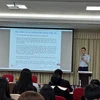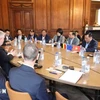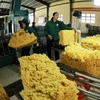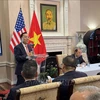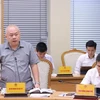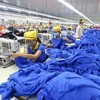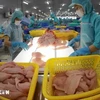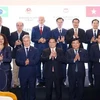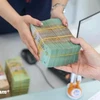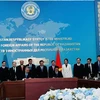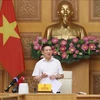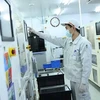The free trade agreement being negotiated between Vietnam and the EU is expected to encourage businesses to reform and update technology, an important factor in promoting green growth in the country, according to the deputy chairman of the HCM City People's Committee.
Tat Thanh Cang, speaking at a briefing organised by EuroCham and its Green Growth Sector on June 18 in HCM City, said that Vietnam should target green growth to ensure sustainable development.
"In Vietnam, green growth mainly includes sustainable production and consumption, reduction of greenhouse gas emissions, greening business activities business via environmentally-friendly advanced technologies, building sustainable infrastructure, and reforming economic instruments," Cang said.
To achieve the green growth target, however, other goals should be met, he said.
Management agencies, businesses and the public must all be part of the national effort, he added.
He said that challenges exist in implementing green growth, particularly in funding, regulation and education.
A large source of investment capital, for example, is needed for environmentally friendly technologies.
Vietnamese enterprises, most of which are small- and medium-sized companies, do not have sufficient capital for such investment.
Cang suggested the Government issue new policies to help SMEs, especially in tax, credit policies and administrative procedures. This would help them access loans more easily to update technologies.
He said that schools, hospitals and residents also need to be better informed about environmental protection, and suggested that Vietnam learn from other countries, including the EU.
The EU-Vietnam free trade agreement began three years ago, and has gone through 13 rounds of negotiation.
Speaking at the briefing on June 18, Jana Herceg, Deputy Head of the economics and trade section at the EU Delegation to Vietnam, said the most recent round of the FTA was held in Brussels.
"We are now hopefully approaching the final stage of these negotiations," she said.
Herceg said that Commissioner Cecilia Malmstrom and her Vietnamese counterpart Minister Vu Huy Hoang, who met recently in Kuala Lumpur for the EU-ASEAN Economic Minister Meeting, said negotiations were expected to conclude this summer.
"They are meeting in Brussels next week and we can expect further progress in the discussions," Herceg said.
Agreement has been reached on tariffs and provisions on trade and sustainable development, she said. This includes commitments to core International Labour Organisation standards and conventions as well as multilateral environmental agreements.
Negotiations, however, continue on a Green Tech Annex, which is expected to foster trade and investment to promote energy generation from renewable and sustainable non-fossil fuels, according to Herceg.
Under the Green Tech Annex, tariffs would be reduced or removed for products that are relevant for this sector. In addition, all the parties involved would have regulatory convergence in the renewable energy sector (solar, wind, biomass), Herceg said.
Trade in the renewable energy sector would be beneficial to all countries in the FTA, and clear rules would provide better trade opportunities and instill investor confidence.
Vietnam would be able to profit from the EU's successful experience in developing a renewable energy sector, Herceg said.
"It is our aim to conclude the Annex, which would contain specific rules for the renewable energy sector on non-discriminatory treatment in general (licensing and authorisation procedures), on local content in particular, and on the use of standards. In addition, we want to foster cooperation in this sector to bring about further regulatory convergence," she said.
Eurocham said the FTA would have a positive impact on trade for Vietnam. In 2013, the EU was not only one of Vietnam's biggest trade partners, with a total value of trade in goods of 27.6 billion euros, it was also among the biggest investors in Vietnam, with 1,810 foreign development investment projects.-VNA
Tat Thanh Cang, speaking at a briefing organised by EuroCham and its Green Growth Sector on June 18 in HCM City, said that Vietnam should target green growth to ensure sustainable development.
"In Vietnam, green growth mainly includes sustainable production and consumption, reduction of greenhouse gas emissions, greening business activities business via environmentally-friendly advanced technologies, building sustainable infrastructure, and reforming economic instruments," Cang said.
To achieve the green growth target, however, other goals should be met, he said.
Management agencies, businesses and the public must all be part of the national effort, he added.
He said that challenges exist in implementing green growth, particularly in funding, regulation and education.
A large source of investment capital, for example, is needed for environmentally friendly technologies.
Vietnamese enterprises, most of which are small- and medium-sized companies, do not have sufficient capital for such investment.
Cang suggested the Government issue new policies to help SMEs, especially in tax, credit policies and administrative procedures. This would help them access loans more easily to update technologies.
He said that schools, hospitals and residents also need to be better informed about environmental protection, and suggested that Vietnam learn from other countries, including the EU.
The EU-Vietnam free trade agreement began three years ago, and has gone through 13 rounds of negotiation.
Speaking at the briefing on June 18, Jana Herceg, Deputy Head of the economics and trade section at the EU Delegation to Vietnam, said the most recent round of the FTA was held in Brussels.
"We are now hopefully approaching the final stage of these negotiations," she said.
Herceg said that Commissioner Cecilia Malmstrom and her Vietnamese counterpart Minister Vu Huy Hoang, who met recently in Kuala Lumpur for the EU-ASEAN Economic Minister Meeting, said negotiations were expected to conclude this summer.
"They are meeting in Brussels next week and we can expect further progress in the discussions," Herceg said.
Agreement has been reached on tariffs and provisions on trade and sustainable development, she said. This includes commitments to core International Labour Organisation standards and conventions as well as multilateral environmental agreements.
Negotiations, however, continue on a Green Tech Annex, which is expected to foster trade and investment to promote energy generation from renewable and sustainable non-fossil fuels, according to Herceg.
Under the Green Tech Annex, tariffs would be reduced or removed for products that are relevant for this sector. In addition, all the parties involved would have regulatory convergence in the renewable energy sector (solar, wind, biomass), Herceg said.
Trade in the renewable energy sector would be beneficial to all countries in the FTA, and clear rules would provide better trade opportunities and instill investor confidence.
Vietnam would be able to profit from the EU's successful experience in developing a renewable energy sector, Herceg said.
"It is our aim to conclude the Annex, which would contain specific rules for the renewable energy sector on non-discriminatory treatment in general (licensing and authorisation procedures), on local content in particular, and on the use of standards. In addition, we want to foster cooperation in this sector to bring about further regulatory convergence," she said.
Eurocham said the FTA would have a positive impact on trade for Vietnam. In 2013, the EU was not only one of Vietnam's biggest trade partners, with a total value of trade in goods of 27.6 billion euros, it was also among the biggest investors in Vietnam, with 1,810 foreign development investment projects.-VNA
